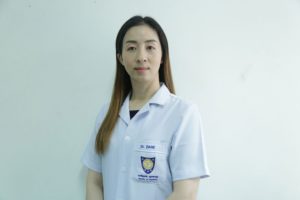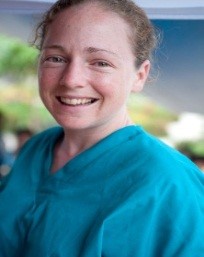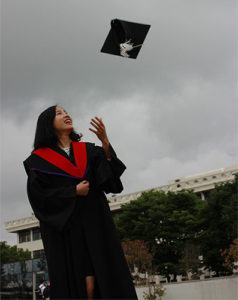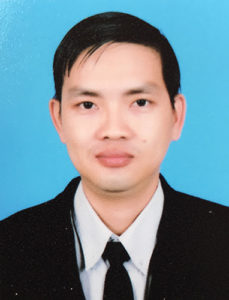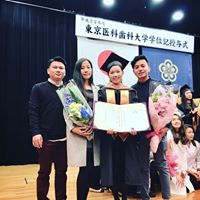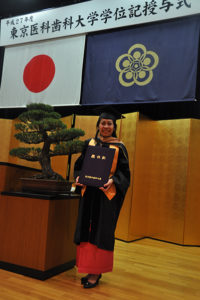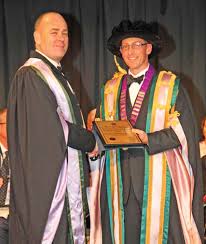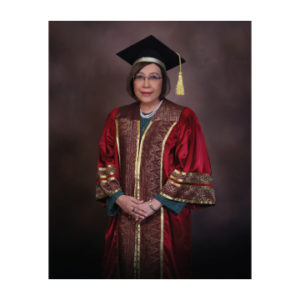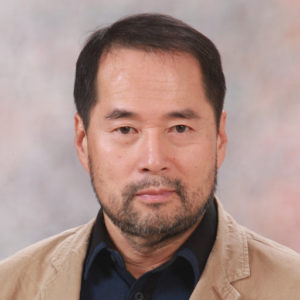As Cambodia is becoming more technologically advanced and research focused there is an increased need for professionals with a practical and solid scientific background who are able to provide research support in a variety of fields including chemical, pharmaceutical, food industry, cosmetics, environmental biology, agriculture, forensics, bioscience, microbiology, tissue culture sustainability policy, etc. Therefore, the Science Research Department of University Puthisastra is playing an active role in supporting the STI roadmap, by aligning its curriculum to the STI Roadmap, whilst also promoting and engaging in STEM research that is supported by the Cambodian government. By including the STI roadmap aims into the curriculum, Cambodian universities can offer exciting and modern degrees that will provide Cambodian graduates with a whole new range of study and employment opportunities in science fields both in Cambodia and internationally, whilst supporting the country to meet their STI Roadmap goals and creating the science and technology leaders of tomorrow.
The UP faculty of Science and Technology, especially in science research program has a wide range:
- Biotechnology
- Chemistry (Analytical, organic and inorganic chemistry)
- Food (Food processing, food testing and analysis)
- Environmental (Soil, air and wastewater)
- Microbiology
- Molecular biology
- Tissue culture (Plant and animal)
- Agriculture
Publications
- Be, S., Peung, K., (2024). Overview of Antimicrobial Resistance and Use in Cambodia. STI Focus “Science, Technology and Innovation”, Volume 3, issue 2/2024, pp. 15-19. https://shorturl.at/O0sI9
- Be, S., Lim, C., Phally, S., Neang, S., & Sok, C., (2024). Exploring Demographic and Behavioral Factors Influencing Knowledge and Participation in Health Check-Ups Among University Students. STI Focus “Science, Technology and Innovation”, Volume 3, issue 2/2024, pp. 20-26. https://shorturl.at/zjsut
- Peung, K., Be, S., Chhun, S., Heng, S., Say, S., Yem, V., Hem, C., Toem, L. (2024). Assessing the Safety of Drinking Water in Urban Slum VS. Rural Cambodia: Escherichia coli Detection Using H2S Test Kits. The 50th International Congress on Science, Technology and Technology-based Innovation, pp. 41. https://stt50.scisoc.or.th/stt50/downloads/AbstractBook.pdf
- Leng, S., Men, K., Penh, R., Be, S., Heng, S. (2024). Determination of Extracted DNA From Human Blood Cells Using QIAAMP® DNA Blood Mini Kit. In STT50. The 50th International Congress on Science, Technology and Technology-based Innovation, pp. 41. https://stt50.scisoc.or.th/stt50/downloads/AbstractBook.pdf
- Chao, C. T. C., Makara, S. P., Soknea, S. L., Chao, S., Ann, R., & Chhun, S. (2024). Determination of formaldehyde in fresh seafood from Cambodia’s local market. Journal of Cambodian Health, 2(1). https://doi.org/10.70243/jch2024.2102
- Orn, S., Horn, C., Kaosuon, K. S., Be, S., & Chhun, S. (2024). Effect of Temperature and Storage Duration on Vitamin C Content in Pursat Orange Juice (Citrus sinensis (L.) Osbeck). The 50th International Congress on Science, Technology and Technology-based Innovation, pp. 217. https://stt50.scisoc.or.th/stt50/downloads/AbstractBook.pdf
- Pek, L., Makara, S. P., Soknea, S. L., Phally, P., Chao, C. T. C., Phal, P., & Chhun, S. (2024). Quantification of Sodium Dithionite in Bean Sprouts from Markets Located in Phnom Penh, Cambodia. The 50th International Congress on Science, Technology and Technology-based Innovation, pp. 96. https://stt50.scisoc.or.th/stt50/downloads/AbstractBook.pdf
- Soknea, S. L., Makara, S. P., Moore, T. J., & Chhun, S. (2024). Microplastic Pollution – A Treat to Human Health: What can Cambodia Do? The 50th International Congress on Science, Technology and Technology-based Innovation, pp. 258. https://stt50.scisoc.or.th/stt50/downloads/AbstractBook.pdf
- Say, S., Chhea, C., Lo, K., Ung, P., (2024). Level 2 Quality of Care Assessment at Referral Hospitals in Kampong Thom, Kampot, and Kep Provinces. Cambodia Journal of Public Health. Vol. 5 No. 25A (2024) November, 2024. https://cjph.niph.org.kh/index.php/cjph/article/view/390
- Heng, S., Hak, M., Som, D., Sort. S., (2024). Identification of Alpha-Galactosidase Gene in Tomato Plant. Journal of Cambodian Health, 2(1). https://doi.org/10.70243/jch2024.2103
- Be, S., Ngory, L., Sean, V., Theam, A., (2023). Removal of Cadmium from River Water and Ground Water by Using Eggshell as Adsorbent. STI Focus “Science, Technology and Innovation”. Volume 2, Issue 2/2023-December 2023, pp. 12-16. https://misti.gov.kh/public/file/202401091704791516.pdf
- Chhun, S., Meng, S., Makara, S., Chey, T., (2023). Determination of Sodium Dithionite in Ginger, Lemongrass, and Bean Sprout. STI Focus “Science, Technology and Innovation”. Volume 2, Issue 2/2023-December 2023, pp. 22-26. https://misti.gov.kh/public/file/202401091704791516.pdf
- Be, S., Peung, K., Vimol, O, M., Sim, N., (2023). The Potential of Drinking Water Pollution at Various Stages of People’s Consumption by Using H2S Test. STI Focus “Science, Technology and Innovation”. Volume 2, Issue 1/2023-June 2023, pp. 24-28. https://misti.gov.kh/public/file/202308291693300779.pdf
- Be, S., Vinitnantharat, S., & Pinisakul, A. (2021). Effect of mangrove biochar residue amended shrimp pond sediment on nitrogen adsorption and leaching. Sustainability, 13(13), 7230.
- Be, S., and Pinisakul, A. (2021). Enhancing Mangrove Biochar Residue for Phosphate Adsorption by Modified with Fe3+, K, and Na+. 47th International Congress on Science Technology and Technology-based Innovation “Sciences for SDGs: Challenges and Solutions”, pp. 265-272.
- Chhun, S., Thongkon, N., and Thanasupsin, S.P., 2021, “Method Validation for Determination of Methyltestosterone in Nile Tilapia by Supercritical Fluid with Carbon Dioxide as a Green Extraction Technique for HPLC Analysis”, International E-Conference on Applied Sciences Society and Economic 2021, pp. 59-66
- Chhun, S., Thongkon, N., and Thanasupsin, S.P., 2021, “Method Validation for Determination of Methyltestosterone in Nile Tilapia by Supercritical Fluid with Carbon Dioxide as a Green Extraction Technique for Hplc Analysis”, Asian Journal of Fundamental and Applied Sciences, Vol. 2, No. 2, pp. 77-84.
- BE, S., MOORE, T. (2022, October 13–14). Determination of Phosphorus Content of Rice Field Soil Samples in Villages at Kompong Speu Province, Cambodia. [Poster presentation]. Research Conference
- BE, S., MOORE, T (2022, October 13–14) Achieving Cambodia’s Science, Technology and Innovation Roadmap Goals – How Cambodia’s Universities Can Support These Aims. [Poster presentation]. Research Conference “Improving Cambodian Health and Wellbeing – ways forward”, University of Puthisastra (UP), Phnom Penh, Cambodia.
- BE, S., MOORE, T. (2022, October 13–14) Investigation of Mercury Content in Skin Whitening Creams in Phnom Penh, Cambodia from 2008 to 2015. [Oral presentation]. Research Conference “Improving Cambodian Health and Wellbeing – ways forward”, University of Puthisastra (UP), Phnom Penh, Cambodia.
- CHHUN, S. MOORE, T. (2022, October 13–14) Identifying Phosphoric Acid Levels in Carbonated Drinks Using UV-spectrophotometry. [Poster presentation]. Research Conference “Improving Cambodian Health and Wellbeing – ways forward”, University of Puthisastra (UP), Phnom Penh, Cambodia.
- CHHUN, S., MOORE, T. (2022, October 13–14) Microplastic Pollution – A Threat to Human Health: What can Cambodia do? [Poster presentation]. Research Conference “Improving Cambodian Health and Wellbeing – ways forward”, University of Puthisastra (UP), Phnom Penh, Cambodia.
Research is a cornerstone of innovation, driving the creation of new knowledge, solutions, and technologies that address the challenges of the digital era. At the University of Puthisastra, research within the Faculty of Science and Technology plays a crucial role in advancing education, informing curriculum design, and fostering academic and professional excellence for the future workforce.
The Faculty of Science and Technology is committed to conducting impactful research with local, national, and international significance, aligned with the rapidly evolving fields of Information Technology, Computer Engineering, Artificial Intelligent, and Data Science. Our mission is to cultivate innovation, strengthen Cambodia’s digital transformation, and contribute to the global knowledge economy through cutting-edge research and collaboration.
The faculty actively engages in a wide range of research areas, with particular emphasis on:
- Computer Networks and Cybersecurity– exploring network architecture, security protocols, access control, digital forensics, and resilience against cyber threats.
- Computer Engineering and Emerging Technologies– focusing on embedded systems, hardware design, Internet of Things (IoT), robotics, and smart systems.
- Data Science and Artificial Intelligence– advancing research in big data analytics, machine learning, natural language processing, computer vision, and decision-support systems for diverse industries.
With a strong commitment to research excellence, the faculty continuously seeks partnerships with local industries, government institutions, and international universities. Through these collaborations, the Faculty of Science and Technology aspires to become a leading hub of scientific innovation, driving Cambodia’s progress in digital technology and contributing meaningfully to the global scientific community.
In summary, the Faculty of Science and Technology at the University of Puthisastra is committed to:
- Conducting high-quality, interdisciplinary research that addresses real-world problems in AI, computer network engineering, computer science, and data science.
- Enhancing education and training by integrating research discoveries into curricula and providing students with practical research experience.
- Collaborating with national stakeholders and international partners to foster innovation and knowledge exchange.
Publications
- Tam Sakirin and Rachid Ben Said, (2025), EDRAAK, Vol. (2025), pp. 38–46, ISSN:3078-8412
- C. Sokea and S. Marina, (2025), Improving Diagnostic Accuracy of Brain Tumor MRI Classification Using Generative AI and Deep Learning Techniques, Babylonian Journal of Artificial Intelligence, pp. 55-63.https://doi.org/10.58496/BJAI/2025/005
- D. Sovannareach, H. Danet and P. Sophea, (2025), Workflow Optimization Using Hybrid Methodologies for Mitigating Overtasking, 16th International IEEE Conference on Software, Knowledge, Information Management and Application (SKIMA 2024)
- Tam Sakirin and Rachid Ben Said, (2025), Deep Learning-Based Model Fake News Detection, 2nd International Conference for Ummah, Proceeding
- Abdulroya Benseng and Tam Sakirin, (2024), “Mapping the Evolution of Arabic Language Research: A Bibliometric Approach”, Mesopotamian Journal of Arabic Language Studies, 2024, 1-15. DOI: 10.58496/MJALS/2024/001
- Tam Sakirin and Siddartha Kusuma, (2023), A Survey of Generative Aritificial Intelligence Techniques, Babylonian Journal of Artificial Intelligence, Vol. (2023), pp. 10–14, DOI:10.58496/BJAI/2023/003
- S. Tam and Ö. Ö. Tanriöver, (2023), “Multimodal Deep Learning Crime Prediction Using Tweets,” in IEEE Access, vol. 11, pp. 93204-93214, DOI: 10.1109/ACCESS.2023.3308967.
- Tam Sakirin and Rachid Ben Said, (2023), User preferences for ChatGPT-powered conversational interfaces versus traditional methods, Mesopotamian Journal of Computer Science, vol.2023, pp.22-28. DOI:10.58496/MJCSC/2023/004
- Tam Sakirin and Iqra Asif, (2023), Infusing k-means for securing IoT services in edge computing, Mesopotamian Journal of Computer Science, Vol. 2023, pp.39-46, DOI: 10.58496/MJCSC/2023/007
- Samer Qahtan Hameed, Tam Sakirin and Yahya Hakami, (2021), Integration and development of learning management features into the Colums platform, Mesopotamian Journal of Computer Science: Vol. 2021, pp. 6–12, DOI: 10.58496/MJCSC/2021/002.
- Rachid. B. S., Sakirin. T. & Omer Ozgur. T, (2021), Rule Placement Based Energy Aware Routing in SDN: A Review, 3rd International Conference on Communication and Intelligent System (ICCIS 2021)
- S. Tam, R. B. Said & Ö. Ö. Tanriöver, (2021), “A ConvBiLSTM Deep Learning Model-Based Approach for Twitter Sentiment Classification,” In IEEE Access, vol. 9, pp. 41283-41293, 2021, doi: 10.1109/Access.2021.3064830.
- Sakirin Tam and Ö. Özgür Tanriöver, (2018), Crime Prediction Using Social Sentiment and Socio. Communications Faculty of Sciences University of Ankara Series A2-A3 Physical Sciences and Engineering, vol. 60, no. 1, pp. 11-20, doi:10.1501/Commua1-2_0000000107
- Sakirin Tam and Özgür Tanriöver, (2017), An Assessment of Use of Data Mining Techniques on Social Media Content for Crime Prediction. International Conference On Theoretical and Applied Computer Science and Engineering (Ictacse2017).
- Y. Hakami, S. Tam, A. H. Busalm, & A. C. Husin, (2014), A Review of Factors Affecting the Sharing of Know Ledge in Social Media, Science International, vol. 26, no. 2.
- Hakami Y., Razak A. H. C., & Tam, S. (2014). A CBT Framework for Secondary Schools of Saudi. Sci.Int, vol.1,pp.853–864.
- Hakami Y., Razak A. H. C., & Tam S., (2014). Factor Affecting the Success of CBT in Secondary School of Saudi Arabia, Maxwell Science Publication.
- Sakirin Tam and Azizah Abdulrahman, (2013), Framework of Green It Capability Maturity on IT Product Life Cycle. International Journal of Scientific Knowledge. vol. 4, no. 4, pp.14-24.
- Zhang C., Tam S., Zhou K., Yue X. (2014). Research On Workflow Model Based On Petri Net with Reset Arcs, Cao By., Nasseri H. (Eds) Fuzzy Information & Engineering And Operations Research & Management. Advances in Intelligent Systems and Computing, vol. 211, Springer, Berlin, Heidelberg. Https://Doi.Org/10.1007/978-3-642-38667-1_45



